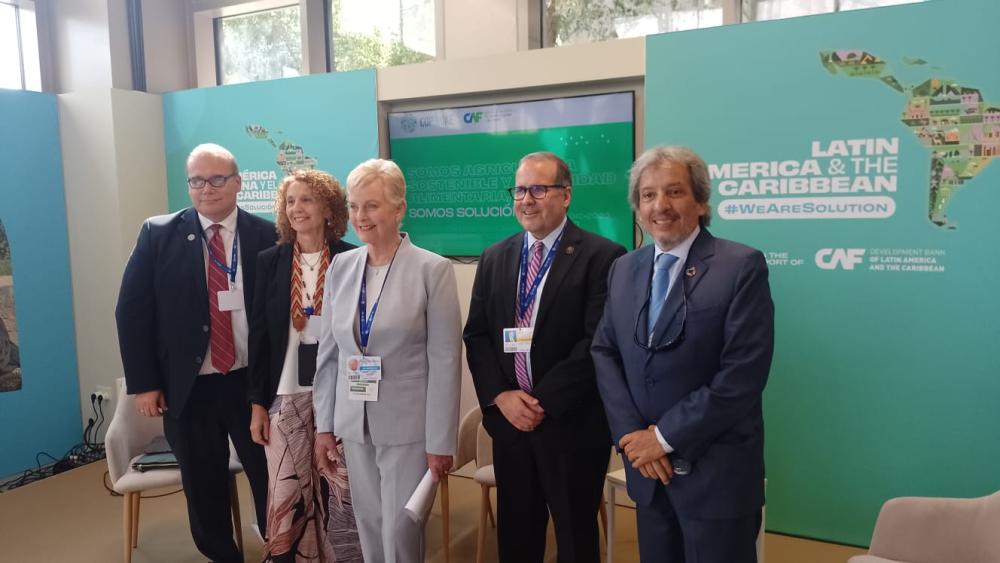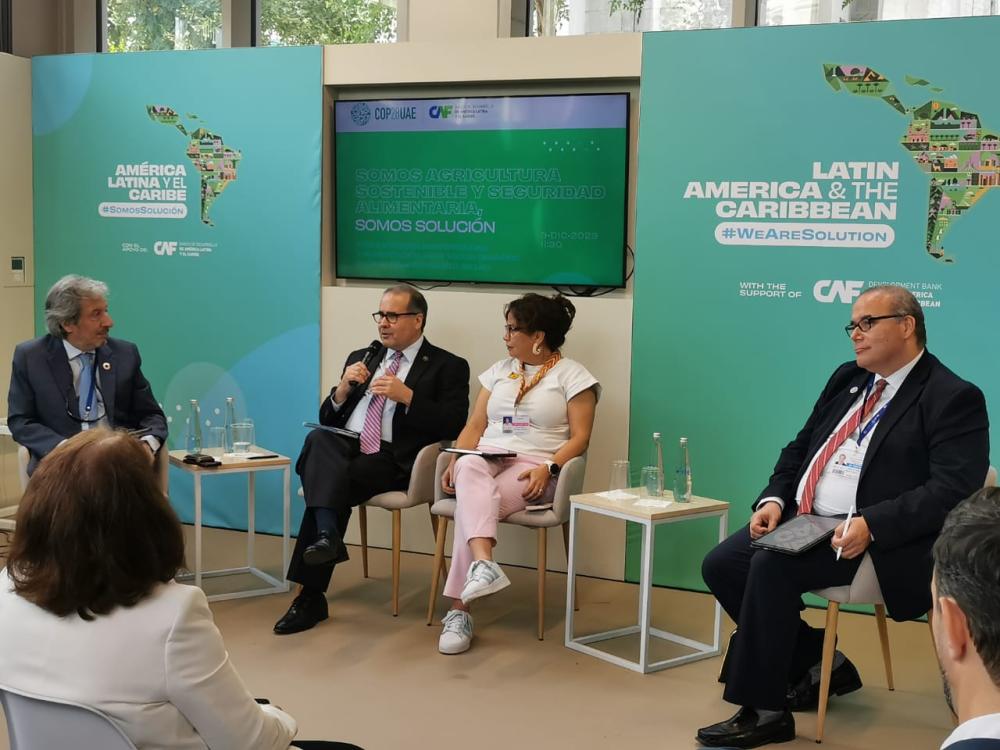At COP28, the 28th Conference of the Parties to the United Nations Framework Convention on Climate Change (UNFCCC), which is being held in the United Arab Emirates, experts from international organizations agreed that Latin America and the Caribbean has enormous potential to meet the demand for food for a burgeoning world population, while at the same time reducing the environmental impact of agricultural activities.

Dubai, United Arab Emirates, December 4, 2023 (IICA). At COP28, the 28th Conference of the Parties to the United Nations Framework Convention on Climate Change (UNFCCC), which is being held in the United Arab Emirates, experts from international organizations agreed that Latin America and the Caribbean has enormous potential to meet the demand for food for a burgeoning world population, while at the same time reducing the environmental impact of agricultural activities.
The Inter-American Institute for Cooperation on Agriculture (IICA) took part in a panel discussion held in the pavilion of the CAF – Development Bank of Latin America and the Caribbean at the world’s most important forum for environmental negotiations, which is meeting in the city of Dubai until December 12. The panelists pointed out that the subcontinent had made great strides in achieving greater sustainability in recent years, and has the resources to make further progress.
The region’s land, water, and biodiversity resources make it the principal underpinning of global food security and environmental sustainability, the speakers said.
The participants were Alicia Montalvo, Manager of Climate Action and Positive Biodiversity at the CAF; Lloyd Day, Deputy Director General of IICA; Cindy McCain, Executive Director of the World Food Programme (WFP); Ángela Penagos, President of Colombia’s Financing Fund for the Agriculture Sector (FINAGRO); and Máximo Torero, Chief Economist at the FAO. The moderator was Manuel Pulgar Vidal, former Minister of Environment of Peru and President of COP20, which was held in Lima in 2014.
“There is a lot of talk about the problems that food production creates in relation to climate change, but we need to talk more about the solutions it offers,” suggested Montalvo, who warned that, in addition to the climate crisis and loss of biodiversity, the world is facing a third crisis: the issue of food security.
“Although many point to agriculture as a sector with high greenhouse gas emissions, we know very well that production in our region is a victim of climate change, and that the environment and agriculture go hand in hand,” Montalvo added.
McCain, speaking on behalf of the WFP, the United Nations agency that distributes food in extreme situations such as wars and natural disasters, also focused on the vulnerability of rural areas in Latin America and the Caribbean to the impact of climate change.
“The Dry Corridor of Central America, for example, has become almost an unlivable area, with farmers finding it impossible to generate income,” said McCain, who advocated focusing on collaboration with climate change adaptation efforts in the most vulnerable areas.

The focus on healthy diets
During the activity, the participants also discussed the direction that the transformations already underway in the subcontinent’s agrifood systems should take, and one point of agreement was the need to focus on promoting healthy diets.
“We have the capacity to feed the world,” said Lloyd Day, who explained that the region’s production systems had made enormous strides, reflected in higher yields with less impact on ecosystems, but there was still room for improvement.
“We don’t invest enough in science and research in the region. New technologies are decisive in reducing environmental impact, as is indigenous knowledge,” Day remarked.
The IICA Deputy Director General, who underlined the need to guarantee trade flows with clear, science-based rules to bolster food security, pointed out that agriculture’s greatest asset as far as climate change mitigation is concerned is its capacity to sequester carbon, which actually makes it a solution. He also stressed the need to include farmers in the debate on the transformation of the activity.
“The region has already demonstrated that its agrifood systems are successful, and it can do even more, increasing productivity and reducing its environmental impact,” he concluded.
Penagos observed that the ongoing transformations of agriculture aimed at climate change mitigation and adaptation should include not only large producers, but also medium- and small-scale farmers. “We cannot allow climate-smart agriculture to widen the inequality gap to the detriment of the poorest farmers,” he said.
The President of FINAGRO also supported the idea of “moving beyond the concept of production to that of agrifood systems, which is a bridge between rural areas and cities.”
“In our region, healthy food is the most expensive in the world. This is adding to overweight and obesity problems,” warned Máximo Torero, who explained that the issue also had to do with the sustainability of production.
Torero touched on the crucial issues for agricultural development in the subcontinent, and suggested that the liberalization of international trade with the elimination of tariff and non-tariff barriers was the key. He also referred to the need to improve access to land for small farmers, and reduce production losses and waste.
More information:
Institutional Communication Division.
comunicacion.institucional@iica.int











